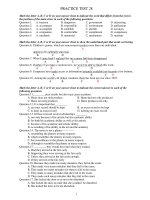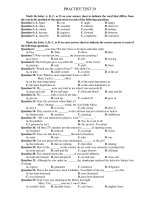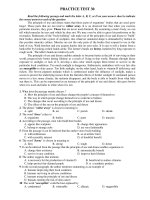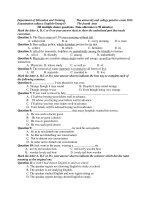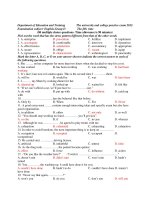Tài liệu Đề Thi Thử Đại Học Khối A1, D Anh Văn 2013 - Phần 6 - Đề 3 docx
Bạn đang xem bản rút gọn của tài liệu. Xem và tải ngay bản đầy đủ của tài liệu tại đây (44.23 KB, 8 trang )
Department of Education and Training
Examination subject: English-Group D
The university and college practice exam 2012.
The sixth time
I. Mark the letter A, B, C, or D on your answer sheet to indicate the word whose underlined
part is pronounced differently from that of the rest in each of the following questions.
Question 1: A. bushes B. wishes C. researches D.
headaches
Question 2: A. debt B. climbing C. timber D. lamb
Question 3: A. enough B. cough C. thorough D.
tough
Question 4: A. apply B. maximum C. cactus D. national
Question 5: A. funny B. rubbish C. upper D. student
II. Mark the letter A, B, C, or D on your answer sheet to indicate the correct answer to each of
the following questions.
Question 6: Generally, the South of England is as ______ as the North.
A. flat B. less flat C. flatter D. the flattest
Question 7: Helen is traveling to Germany tomorrow on her first working trip and she is very
excited ____ it.
A. for B. against C. about D. with
Question 8: He’d hardly finished doing his homework when you arrived, ______?
A. didn’t he B. had he C. would he D. hadn’t he
Question 9: John: “Would you like to have a get-together with us next weekend?” Mickey:
“______.”
A. No, I won’t B. No, I wouldn’t C. Yes, let’s D.
Yes, I’d love to
Question 10: Had they arrived at the shop earlier, they ______ a better selection of clothes.
A. will find B. would be finding C. would have found D. will have
found
Question 11: Before you start cooking, you should gather together all the necessary ______.
A. ingredients B. factors C. substances D. elements
Question 12: What ______ views do Americans and Asians have about love and marriage?
A. tradition B. traditionally C. traditionalism D.
traditional
Question 13: I can’t ______ this noise any longer. I’m going to write a letter of complaint about
this problem.
A. put up with B. take away from C. get back to D.
make out of
Question 14: Helen: “Would you rather go to the beach or to the mountains?” Kim: “______.”
A. That’s very nice of you B. The beach definitely
C. I’d love to go D. Thanks for the mountains
Question 15: George: “______.” Michelle: “Thank you for your compliment.”
A. You’ve done your work B. This is a present for you
C. I’m glad that you’re well again D. You look pretty in this dress
Question 16: Bill managed to get to the train station himself ______ his leg was broken.
A. because B. because of C. in spite of D. although
Question 17: Dr. Smith is the person in ______ I don’t have much confidence.
A. which B. whom C. him D. that
Question 18: This director has ______ some famous films but I think this one is the best.
A. done B. conducted C. made D. composed
Question 19: He wondered ______ his sister looked like, because they hadn’t seen each other
for a long time.
A. why B. which C. how
D. what
Question 20: Does Mr. Ba bring his farm ______ to the local market every day?
A. productivity B. product C. production D.
produce
Question 21: This is ______ the most difficult job I’ve ever had to do.
A. by heart B. by chance C. by far D. by myself
Question 22: Hurry up, or they ______ serving meals by the time we get to the restaurant.
A. stopped B. will have stopped C. are stopping D.
would stop
Question 23: During the Enlightenment, the powers and uses of reason ______.
A. were stressed B. stressed C. were stressing D. had
stressed
Question 24: He is a typical ______, always looking on the bright side of everything.
A. pessimist B. introvert C. extrovert D. optimist
Question 25: That style of dress ___ have been designed by Titian, because it wasn’t worn till
after his death.
A. wouldn’t B. shan’t C. can’t D. oughtn’t
Question 26: Bottles of medicine must have childproof caps ______ children think medicine is
candy and poison themselves. A. even though B. if so C. so
that D. in case
Question 27: My favorite team ___ 15 games so far this season, and will probably win the
championship.
A. are winning B. won C. have won
D. will win
Question 28: You should have ______ your composition carefully before you handed it in.
A. seen through B. thought of C. looked in D. gone over
Question 29: “Don’t worry about your necklace. Give it to me and I promise to ______ great
care of it.”
A. bring B. take C. keep D.
make
Question 30: The police are going to look ______ the disappearance of the child.
A. around B. into C. through D. after
III. Mark the letter A, B, C, or D on your answer sheet to indicate the word or phrase that is
closest in meaning to the underlined part in each of the following questions.
Question 31: The crew divided the life preservers among the twenty terrified passengers as the
ship began to sink. A. exhausted B. surprised C. frightened
D. excited
Question 32: You must answer the police’s questions truthfully; otherwise, you will get into
trouble.
A. exactly as things really happen B. with a negative attitude
C. in a harmful way D. as trustingly as you can
Question 33: My mom is always bad-tempered when I leave my room untidy.
A. feeling embarrassed B. talking too much
C. very happy and satisfied D. easily annoyed or irritated
Question 34: During the earthquake, a lot of buildings collapsed, which killed thousands of
people.
A. went off accidentally B. fell down unexpectedly
C. exploded suddenly D. erupted violently
Question 35: We really appreciate your help, without which we couldn’t have got our task done
in time.
A. feel thankful for B. depreciate C. require D. are proud
of
IV. Mark the letter A, B, C, or D on your answer sheet to show the underlined part that needs
correction in each of the following questions.
Question 36: The bigger of the three daily meals for most American families is dinner, served at
about 6.
A B C D
Question 37: The word “scuba” is actually an acronym that comes of the phrase “self-contained
underwater
A B C D
breathing apparatus”.
Question 38: Building thousands of years ago, the ancient palace is popular with modern
tourists.
A B C D
Question 39: The old woman cannot remember the place which she kept her savings.
A B C D
Question 40: I found my new contact lenses strangely at first, but I got used to them in the end.
A B C D
V. Mark the letter A, B, C, or D on your answer sheet to indicate the correct answer to each of
the following questions.
Question 41: ______ for breakfast is bread and eggs.
A. That I only like B. Which better I like C. What I like most D. The food
what I like
Question 42: Before he was 20, he developed ______ for the personal computer.
A. the world first computer's language B. the computer language for the first world
C. the world's first computer language D. the first world's computer language
Question 43: According to the conditions of my scholarship, after graduation, ______.
A. I will be employed full-time by the university B. I would be offered by the
university
C. the university will employ me full-time D. an employer will give me a full-
time job
Question 44: He has been to the school library many times ______.
A. if the semester has started B. while the semester is starting
C. since the semester started D. after the semester starts
Question 45: Only after food has been dried or canned ______.
A. should it be stored for later consumption B. it can be stored for later
consumption
C. that it is stored for later consumption D. was it stored for later
consumption
VI. Mark the letter A, B, C, or D on your answer sheet to indicate the sentence that is closest
in meaning to each of the following questions.
Question 46: The test we did last time was more difficult than this one.
A. We did an easy test last time and a difficult one this time.
B. This test is not as difficult as the one we did last time.
C. This time we have to do the most difficult test of all.
D. The test we have done this time is not difficult at all.
Question 47: He cannot practice scuba diving because he has a weak heart.
A. The fact that he has a weak heart cannot stop him practicing scuba diving.
B. Scuba diving makes him suffer from having a weak heart.
C. The reason why he cannot practice scuba diving is that he has a weak heart.
D. He has a weak heart but he continues to practice scuba diving.
Question 48: She asked John to repeat what he had said.
A. “Will you please repeat what John said?” she asked. B. “Please repeat what you said,
John,” she said.
C. “You have to repeat what you say, John,” she said. D. “Please repeat what you said to
John,” she said.
Question 49: People believe that neither side wanted war.
A. Neither side is believed to have wanted war. B. Neither side is responsible for the
outbreak of war.
C. War is believed to be wanted by either side. D. It is believed that war broke out from
both sides.
Question 50: “No, it’s not true. I didn’t steal the money!” Jean said.
A. Jean refused to steal the money. B. Jean did not intend to steal the
money.
C. Jean admitted stealing the money. D. Jean denied having stolen the
money.
VII. Read the following passage taken from Microsoft Encarta 2009, and mark the letter A,
B, C, or D on your answer sheet to indicate the correct word for each of the blanks from 51 to
60.
Schools in the United States have not always had a large number of libraries. As
(51)______ as 1958 about half of the public schools in the United States had no libraries at all.
The (52)______ of public school libraries increased dramatically when the federal government
passed the Elementary and Secondary Education Act of 1965, (53)______ provided funds for
school districts to improve their education programs and facilities, including their libraries.
(54)______, many educators claim that since the legislation was passed federal spending has not
increased sufficiently to meet the rising (55)______ of new library technologies such as
computer databases and Internet access.
Because the federal government provides only limited funds to schools, individual school
districts (56)______ on funds from local property taxes to meet the vast majority of public
school expenses. Therefore, the libraries of public schools tend to reflect the (57)______
capabilities of the communities in which they are located. Districts in wealthy suburbs often have
fully staffed libraries (58)______ abundant resources, spacious facilities, and curricular and
instructional support. In (59)______, school districts in many poor areas house their libraries in
ordinary classrooms or in small rooms. The libraries in such areas are generally staffed by
volunteers, who organize and (60)______ books that are often out-of-date, irrelevant, or
damaged.
Question 51: A. frequently B. recently C. freshly D. newly
Question 52: A. digit B. amount C. number D. numeral
Question 53: A. that B. who C. which D. this
Question 54: A. Otherwise B. Therefore C. Consequently D.
Nevertheless
Question 55: A. fine B. fee C. cost D. sum
Question 56: A. go B. come C. rely D. stay
Question 57: A. economical B. educational C. financial D.
political
Question 58: A. for B. with C. on D. by
Question 59: A. contrast B. converse C. contrary D. conflict
Question 60: A. maintain B. obtain C. contain D. attain
VIII. Read the following passage taken from Building skills for the TOEFL iBT – Advanced
by Linda Robinson Fellag, and mark the letter A, B, C, or D on your answer sheet to indicate
the correct answer to each of the questions from 61 to 70.
MICKEY MANTLE
Mickey Mantle was one of the greatest baseball players of all time. He played for the
New York Yankees in their years of glory. From the time Mantle began to play professionally in
1951 to his last year in 1968, baseball was the most popular game in the United States. For many
people, Mantle symbolized the hope, prosperity, and confidence of America at that time.
Mantle was a fast and powerful player, a “switch-hitter” who could bat both right-handed
and left-handed. He won game after game, one World Series championship after another, for his
team. He was a wonderful athlete, but this alone cannot explain America’s fascination with him.
Perhaps it was because he was a handsome, red-haired country boy, the son of a poor
miner from Oklahoma. His career, from the lead mines of the West to the heights of success and
fame, was a fairy-tale version of the American dream. Or perhaps it was because America
always loves a “natural”: a person who wins without seeming to try, whose talent appears to
come from an inner grace. That was Mickey Mantle.
But like many celebrities, Mickey Mantle had a private life that was full of problems. He played
without complaint despite constant pain from injuries. He lived to fulfill his father’s dreams and
drank to forget his father’s early death.
It was a terrible addiction that finally destroyed his body. It gave him cirrhosis of the
liver and accelerated the advance of liver cancer. Even when Mickey Mantle had turned away
from his old life and warned young people not to follow his example, the destructive process
could not be stopped. Despite a liver transplant operation that had all those who loved and
admired him hoping for a recovery, Mickey Mantle died of cancer at the age of 63.
Question 61: What is the main idea of the passage?
A. Mickey Mantle’s success and private life full of problems
B. Mickey Mantle as the greatest baseball player of all time
C. Mickey Mantle and the history of baseball D. Mickey Mantle and his career as a
baseball player
Question 62: It can be inferred from paragraph 1 that Mantle ______.
A. introduced baseball into the US B. earned a lot of money from
baseball
C. had to try hard to be a professional player D. played for New York
Yankees all his life
Question 63: According to the passage, Mantle could ______.
A. bat better with his left hand than with his right hand B. hit with the bat on either
side of his body
C. give the most powerful hit in his team D. hit the ball to score from a
long distance
Question 64: The word “this” in paragraph 2 refers to ______.
A. Mantle’s being fascinated by many people B. Mantle’s being a
wonderful athlete
C. Mantle’s being a “switch-hitter” D. Mantle’s being a fast and
powerful player
Question 65: It can be inferred from the passage that for most Americans ______.
A. success in Mantle’s career was difficult to believe
B. Mantle had a lot of difficulty achieving fame and success
C. success in Mantle’s career was unnatural
D. Mantle had to be trained hard to become a good player
Question 66: The author uses the word “But” in paragraph 4 to ______.
A. explain how Mantle got into trouble B. give an example of the trouble in Mantle’s
private life
C. change the topic of the passage D. give an argument in favor of Mantle’s
success and fame
Question 67: The word “fulfill” in paragraph 4 mostly means ______.
A. achieve what is hoped for, wished for, or expected B. do something in the way that you
have been told
C. do what you have promised or agreed to do D. get closer to something that you are
chasing
Question 68: The word “accelerated” in paragraph 5 is closest in meaning to ______.
A. delayed B. worsened C. bettered D. quickened
Question 69: We can see from paragraph 5 that after his father’s death, Mantle ______.
A. forgot his father’s dream B. suffered a lot of pain C. led a happier life D. played
even better
Question 70: Which of the following is mentioned as the main cause of the destruction of
Mantle’s body?
A. His way of life B. His loneliness C. His own dream D. His liver
transplant operation
IX. Read the following passage taken from Cultural Guide – Oxford Advanced Learner’s
Dictionary, 7
th
Edition, and mark the letter A, B, C, or D on your answer sheet to indicate the
correct answer to each of the questions from 71 to 80.
The countryside of Britain is well known for its beauty and many contrasts: its bare
mountains and moorland, its lakes, rivers and woods, and its long, often wild coastline. Many of
the most beautiful areas are national parks and are protected from development. When British
people think of the countryside they think of farmland, as well as open spaces. They imagine
cows or sheep in green fields enclosed by hedges or stone walls, and fields of wheat and barley.
Most farmland is privately owned but is crossed by a network of public footpaths.
Many people associate the countryside with peace and relaxation. They spend their free
time walking or cycling there, or go to the country for a picnic or a pub lunch. In summer people
go to fruit farms and pick strawberries and other fruit. Only a few people who live in the country
work on farms. Many commute to work in towns. Many others dream of living in the country,
where they believe they would have a better and healthier lifestyle.
The countryside faces many threats. Some are associated with modern farming practices,
and the use of chemicals harmful to plants and wildlife. Land is also needed for new houses. The
green belt, an area of land around many cities, is under increasing pressure. Plans to build new
roads are strongly opposed by organizations trying to protect the countryside. Protesters set up
camps to prevent, or at least delay, the building work.
America has many areas of wild and beautiful scenery, and there are many areas,
especially in the West in states like Montana and Wyoming, where few people live. In the New
England states, such as Vermont and New Hampshire, it is common to see small farms
surrounded by hills and green areas. In Ohio, Indiana, Illinois and other Midwestern states, fields
of corn or wheat reach to the horizon and there are many miles between towns.
Only about 20% of Americans live outside cities and towns. Life may be difficult for
people who live in the country. Services like hospitals and schools may be further away and
going shopping can mean driving long distances. Some people even have to drive from their
homes to the main road where their mail is left in a box. In spite of the disadvantages, many
people who live in the country say that they like the safe, clean, attractive environment. But their
children often move to a town or city as soon as they can.
As in Britain, Americans like to go out to the country at weekends. Some people go on camping
or fishing trips, others go hiking in national parks.
Question 71: We can see from the passage that in the countryside of Britain ______.
A. none of the areas faces the sea B. only a few farms are publicly
owned
C. most beautiful areas are not well preserved D. it is difficult to travel from one
farm to another
Question 72: The word “enclosed” in paragraph 1 is closest in meaning to ______.
A. rotated B. embraced C. blocked D. surrounded
Question 73: Which is NOT mentioned as an activity of relaxation in the countryside of Britain?
A. Going swimming B. Picking fruit C. Going for a walk D. Riding a
bicycle
Question 74: What does the word “they” in paragraph 2 refer to?
A. Those who dream of living in the country B. Those who go to fruit farms in
summer
C. Those who go to the country for a picnic D. Those who commute to work in
towns
Question 75: Which of the following threatens the countryside in Britain?
A. Protests against the building work B. Modern farming practices
C. Plants and wildlife D. The green belt around cities
Question 76: The phrase “associated with” in paragraph 3 is closest in meaning to ______.
A. supported by B. referred to C. separated from D. related to
Question 77: According to the passage, all of the following are true EXCEPT ______.
A. the use of chemicals harms the environment of the countryside
B. camps are set up by protesters to stop the construction work
C. the green belt is under pressure because of the need for land
D. all organizations strongly oppose plans for road construction
Question 78: The phrase “reach to the horizon” in paragraph 4 is closest in meaning to ______.
A. are limited B. are endless C. are horizontal D. are varied
Question 79: According to the passage, some Americans choose to live in the country because
______.
A. their children enjoy country life B. they enjoy the safe, clean, attractive environment
there
C. life there may be easier for them D. hospitals, schools and shops are conveniently
located there
Question 80: Which of the following is NOT mentioned in the passage?
A. The majority of American people live in cities and towns.
B. Many British people think of the country as a place of peace and relaxation.
C. Towns in some Midwestern states in the US are separated by long distances.
D. Both British and American people are thinking of moving to the countryside.


